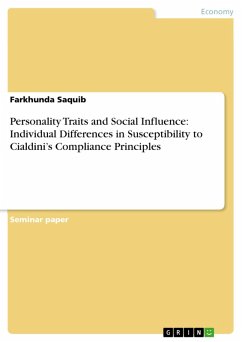Seminar paper from the year 2012 in the subject Business economics - Miscellaneous, grade: 7, University of Amsterdam, language: English, abstract: Over the previous decades, researches have scrutinized social influence - the methods used for changing people's attitudes and behaviors. According to Key et. al. (2005), social influence encompasses two forms of influence: persuasion and compliance. While the former refers to alteration of attitudes, the latter denotes change in behavior. Both forms of social influence have been researched (Albarracin et. al., 2005), although the impact of personality differences has mostly been assessed in the context of persuasion, not compliance (Key et. al., 2009). Marwel and Schmitt in 1960s originally conceived compliance by producing a series of compliance-gaining tactics. Decades later, Robert Cialdini distinguished between six principles through which compliance with persuasive request can be obtained. Compliance according to Robert Cialdini (2001) is the process of getting people to conform to a request. The target complying with the persuasive request may or may not apprehend that he or she is being impelled to act in a particular way (Cialdini & Goldstein, 2004). Jointly Cialdini and Goldstein (2004) define compliance as a submission made in response to a persuasive request. Research on compliance is significant since it is a form of social influence that affects people's everyday behavior (e.g. social interaction). This paper infers how responsiveness to Cialdini's compliance principles varies by personality. Historically, researchers interested in the study of personality differences have mostly relied on the five-factor model (FFM) also referred to as Big Five personality factors (Richard et. al., 2001). Currently, this model is widely used to explain crucial features of personalities among different individuals (Judge et. al., 2002). [...]
Dieser Download kann aus rechtlichen Gründen nur mit Rechnungsadresse in A, B, BG, CY, CZ, D, DK, EW, E, FIN, F, GR, HR, H, IRL, I, LT, L, LR, M, NL, PL, P, R, S, SLO, SK ausgeliefert werden.









